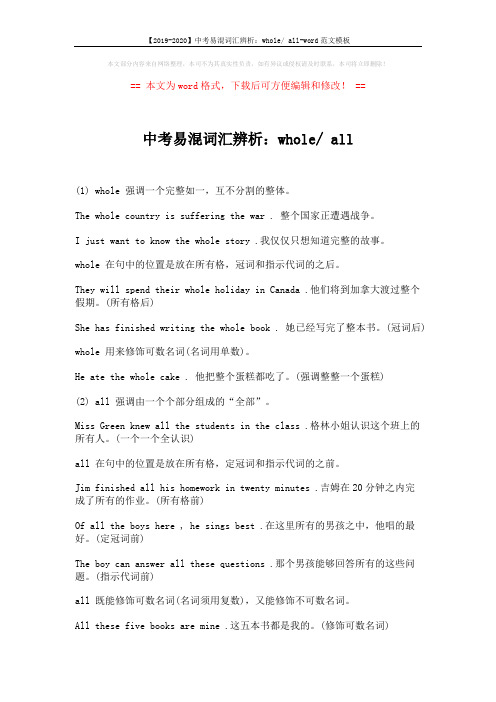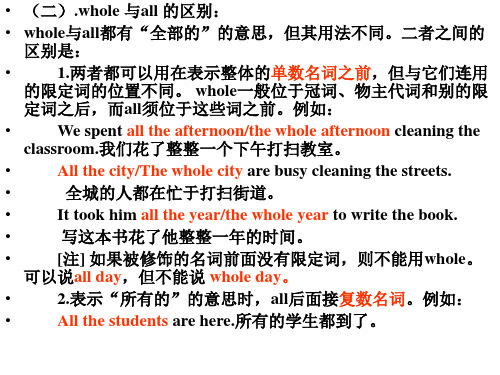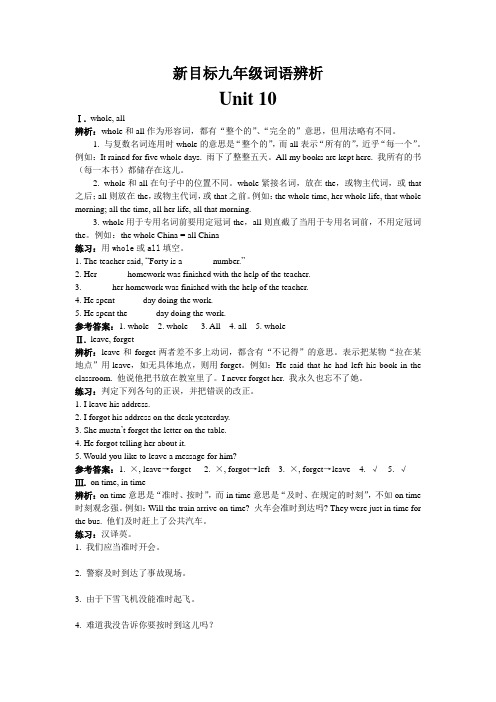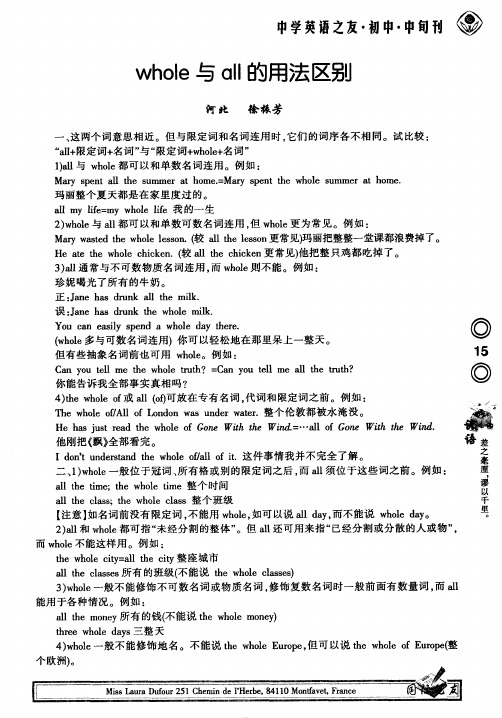whole和all的用法及区别
- 格式:doc
- 大小:33.50 KB
- 文档页数:3

【2019-2020】中考易混词汇辨析:whole/ all-word范文模板本文部分内容来自网络整理,本司不为其真实性负责,如有异议或侵权请及时联系,本司将立即删除!== 本文为word格式,下载后可方便编辑和修改! ==中考易混词汇辨析:whole/ all(1) whole 强调一个完整如一,互不分割的整体。
The whole country is suffering the war . 整个国家正遭遇战争。
I just want to know the whole story .我仅仅只想知道完整的故事。
whole 在句中的位置是放在所有格,冠词和指示代词的之后。
They will spend their whole holiday in Canada .他们将到加拿大渡过整个假期。
(所有格后)She has finished writing the whole book . 她已经写完了整本书。
(冠词后)whole 用来修饰可数名词(名词用单数)。
He ate the whole cake . 他把整个蛋糕都吃了。
(强调整整一个蛋糕)(2) all 强调由一个个部分组成的“全部”。
Miss Green knew all the students in the class .格林小姐认识这个班上的所有人。
(一个一个全认识)all 在句中的位置是放在所有格,定冠词和指示代词的之前。
Jim finished all his homework in twenty minutes .吉姆在20分钟之内完成了所有的作业。
(所有格前)Of all the boys here , he sings best .在这里所有的男孩之中,他唱的最好。
(定冠词前)The boy can answer all these questions .那个男孩能够回答所有的这些问题。
(指示代词前)all 既能修饰可数名词(名词须用复数),又能修饰不可数名词。


whole和all的用法整体和全部的用法一、整体的用法1. 作为形容词使用"整体"是一个表示事物全貌、总体或一切方面的形容词。
它用来描述一个事物的所有部分或成分在某一方面共同构成一个整体。
例如:- The company needs to take a whole new approach to marketing.(公司需要采取全新的市场营销方式。
)- The whole family gathered together for the holiday celebration.(全家人聚集在一起庆祝节日。
)2. 作为名词使用"整体"也可以作为一个名词,指代所有部分组合而成的东西或概念。
例如:- We need to consider the whole of the problem before making a decision.(我们在做决定之前需要考虑问题的全部。
)- The whole of the process was carefully planned and executed.(整个过程都经过了精心计划和执行。
)二、全部的用法1. 作为形容词使用"全部"是指所有可数或不可数事物中的每一个,表示事物中没有任何例外或遗漏。
它常用来描述所有可能相关的人或物,并强调包括了每个个体。
例如:- She ate all the cake by herself.(她一个人吃了整个蛋糕。
)- I have read all the books on this shelf.(我已经把这个书架上的所有书都读过了。
)2. 作为副词使用"全部"也可以作为一个副词,表示完全、整个地或彻底地。
它用来描述动作或状态的程度达到极限。
例如:- The team worked all night to finish the project.(团队通宵工作以完成这个项目。

新目标九年级词语辨析Unit 10Ⅰ. whole, all辨析:whole和all作为形容词,都有“整个的”、“完全的”意思,但用法略有不同。
1. 与复数名词连用时whole的意思是“整个的”,而all表示“所有的”,近乎“每一个”。
例如:It rained for five whole days. 雨下了整整五天。
All my books are kept here. 我所有的书(每一本书)都储存在这儿。
2. whole和all在句子中的位置不同。
whole紧接名词,放在the,或物主代词,或that 之后;all则放在the,或物主代词,或that之前。
例如:the whole time, her whole life, that whole morning; all the time, all her life, all that morning.3. whole用于专用名词前要用定冠词the,all则直截了当用于专用名词前,不用定冠词the。
例如:the whole China = all China练习:用whole或all填空。
1. The teacher said, “Forty is a ______ number.”2. Her ______ homework was finished with the help of the teacher.3. ______ her homework was finished with the help of the teacher.4. He spent ______day doing the work.5. He spent the ______day doing the work.参考答案:1. whole 2. whole 3. All 4. all 5. wholeⅡ. leave, forget辨析:leave和forget两者差不多上动词,都含有“不记得”的意思。

同义词辨析:total、whole、all、entire导航意思: 全部的total:解析: total只作定语,指所有的数目或东西都计算在内的,强调总的数字、数额、数量等。
例句: Her total debts are $800.翻译: 她的全部债务有800美元。
例句: The total shortage was 200 tons.翻译: 短缺总额为两百吨。
whole:解析: whole只作定语,一般只用于修饰单数名词(含集合名词),但前面须有冠词或其他限定词;侧重指某事物的整体,如全部数量、体积、时间等,强调毫无增删、遗漏等。
例句: Dad gave me the whole box of chocolates.翻译: 爸爸把一整盒巧克力都给了我。
例句: The whole village was attacked with influenza.翻译: 全村的人都得了流感。
all:解析: all普通用词,通常用于修饰单数或复数可数名词、不可数名词、物质名词、表示地点的专有名词,应置于冠词、指示代词、物主代词等之前,而 whole 应置于这些词之后。
例句: I want to hear all the details.翻译: 我想听听全部的细节。
例句: All children deserve encouragement.翻译: 所有的孩子都应得到鼓励。
entire:解析: entire较正式用词,只作定语,一般只用于修饰单数名词(包括集合名词),强调团体、时间段、数量等的整体,含不能有所削减或增添之意,用于修饰某一具体事物时常可与 whole 换用。
例句: I am in entire agreement with you.翻译: 我完全同意你的意见。
例句: The entire/whole body of a zebra is marked with black and white stripes.翻译: 斑马的全身都有黑白条纹。

all,whole,entire,total1.all着重“整体”,指各个“个体”或各个“部分”组成的“全部的、所有的”整体。
修饰可数名词复数时,指所有的数量;修饰不可数名词时,指整个范围或全部数量。
位于定冠词、指示代词、物主代词、基数词的前面。
如:All that afternoon I jumped and sang and did all kinds of things.All the Chinese people are going all out for the realization of the four modernizations.全中国人民正全力以赴实现四化而奋斗。
常见短语有:all day,all night,all day long,all the morning,all the summer,all the year,all the month;all his books,all these sentences,all the people,all five men,all the students,all(the)horses,all animals;all the news,all the work,all China,all the world,all the city,all his life…注意:①英美人在all day,all night中常不用the。
其它情况下,美国人常不用the。
②all常可与whole互换,但whole位于定冠词,物主代词等之后。
如:all the afternoon the whole afternoonall the year the whole yearall the city the whole cityall the world the whole world③all与地点名词连用指人,whole指人指地区均可。
因此,whole指地区时,不能与all互换。
知识点小贴士1.fun 多用作名词,Eg, There is more fun in playing soccer than in playing cards.Let's have more fun.同时也可做形容词,一般不使用比较级和最高级,需要时可用more fun,most fun。
一般是用funny代替。
Funny 比较级和最高级是funnier, funniest Eg, Playing soccer is funnier than playing cards.小练习:判断下列fun的词性,并翻译句子1.It is great fun sailing a boat._______ ______________________________________2. She is great fun to be with_______ _______________________________________3.Riding the bike is a lot more fun than taking the bus_______ ______________________________________2.all 和whole的区别在结构方面:在限定词和名词的连用方面不同All+限定词+名词限定词+whole+名词Eg: 整个夏天:all the summer the whole summer在所连接的名词方面:1)复数名词前一般用all, 单数名词前一般用wholeAll the students/all students所有的学生my whole life 我的一生2)只有all 能和不可数名词连用Jane has drunk all the milk.3) 抽象名词可用wholeCan you tell me the whole truth?小练习:Are _______in the classroom?A.all the studentsB. the whole studentsC. whole the studentsD. all students。
知识点小贴士1.fun 多用作名词,Eg, There is more fun in playing soccer than in playing cards.Let's have more fun.同时也可做形容词,一般不使用比较级和最高级,需要时可用more fun,most fun。
一般是用funny代替。
Funny 比较级和最高级是funnier, funniest Eg, Playing soccer is funnier than playing cards.小练习:判断下列fun的词性,并翻译句子1.It is great fun sailing a boat._______ ______________________________________2. She is great fun to be with_______ _______________________________________3.Riding the bike is a lot more fun than taking the bus_______ ______________________________________2.all 和whole的区别在结构方面:在限定词和名词的连用方面不同All+限定词+名词限定词+whole+名词Eg: 整个夏天:all the summer the whole summer在所连接的名词方面:1)复数名词前一般用all, 单数名词前一般用wholeAll the students/all students所有的学生my whole life 我的一生2)只有all 能和不可数名词连用Jane has drunk all the milk.3) 抽象名词可用wholeCan you tell me the whole truth?小练习:Are _______in the classroom?A.all the studentsB. the whole studentsC. whole the studentsD. all students。
whole和all的用法及区别:
这两个词意思相近。
但与限定词和名词连用时,它们的词序各不相同。
有时这两个词大致同义,只是位置不同:all 要放在冠词、指示代词、物主代词等之前,而 whole 应放在这些词之后。
如:
“all + 限定词 + 名词”
“限定词 + whole + 名词”
all the family / the whole family 全家
all the time;the whole time 整个时间
all my life; my whole life 我的一生
all the class;the whole class 整个班级
【注意】如名主词前没有限定词,不能用whole,如可以说all day,而不能说whole day。
1)all与 whole都可以和单数名词连用。
例如:
①Mary spent all the summer at home.
玛丽整个夏天都是在家里度过的。
也可以说成:
②Mary spent the whole summer at home.
③all my life我的一生=my whole life
2)whole与all都可以和单数可数名词连用,但whole更为常见。
例如:
④Mary wasted the whole lesson.
(较 all the lesson更常见)玛丽把整整一堂课都浪费掉了。
⑤He ate the whole chicken.
(较…all the chicken更常见)他把整只鸡都吃掉了。
3)all通常与不可数物质名词连用,而 whole则不能。
在不可数名词之前一般用 all,而不用 whole (偶尔有例外:the whole time / all the time; his whole energy / all hisenergy 等),但在物质名词前则绝对不用 whole。
如:
误:the whole money 正:all the money 所有的钱
误:the whole food 正:all the food 所有的食物
误:the whole wine 正:all the wine 所有的酒
⑥正:Jane has drunk all the milk.
误:Jane has drunk the whole milk.
珍妮喝光了所有的牛奶。
⑦You can easily spend a whole day there.
(whole多与可数名词连用)
你可以轻松地在那里呆上一整天。
▲但有些抽象名词前可用 whole。
例如:
⑧Can you tell me the whole truth?(=Can you tell me all the truth?)
你能告诉全部事实真相吗?
4)the whole of或all(of)可放在专有名词,代词和限定词之前。
例如:
⑨The whole of/All of London was under water.
整个伦敦都被水淹没。
⑩He has just read the whole of Gone With The Wind.(=…all of Gone With The Wind.)
他刚把《飘》全部看完。
I don't understand the whole of/all of it.
这件事情我并不完全了解。
【注意】如名主词前没有限定词,不能用whole,如可以说all day,而不能说whole day。
2)all和whole都可指“未经分割的整体”。
但all还可用来指“已经分割或分散的人和物”,而whole不能这样用。
①the whole city=all the city整座城市
②all the classes所有的班级(不能说the whole classes)
3)whole一般不能修饰不可数名词或物质名词,修饰复数名词时一般前面有数量词,而all 能用于各种情况。
All my friends are poor. 我所有的朋友都很穷。
The whole building was burning. 整座楼都在燃烧。
注意它们在意义上有差别:all 指一个不剩,即“全部”;whole 指一点不缺,即“整个”。
4) 在时间名词(如day, week, month, year 等)以及季节名词(spring,summer, autumn, winter) 之前,两者都可用(注意冠词的位置)。
如:
all (the) day /the whole day 整天
all (the) spring /the whole spring整个春天
Monica spent all (the) day with us. 莫尼卡整天和我们呆在一起。
I waited all (the) week for, him to answer. 我整整一个星期都在等他的回音。
When we were students we would often stay up all (the) night. 我们当学生时,经常通宵不睡。
You have been in the city all (the) summer, I suppose? 我料想你整个夏天都在市内,是吗?
但在表示时间的 hour 和 century 之前,一般用 whole ,不用 all。
如:
I waited for her a [the] whole hour. 我等了她整整 1 小时。
He lived the whole century. 他活过了整个世纪。
He stood the whole hour in the rain. 他在雨中站了整整一个小时。
5) 在表地点的专有名词之前,一般用 all 而不用 whole,但可用the whole of。
如:the whole of Europe(整个欧洲)。
all China / the whole of China 全中国。